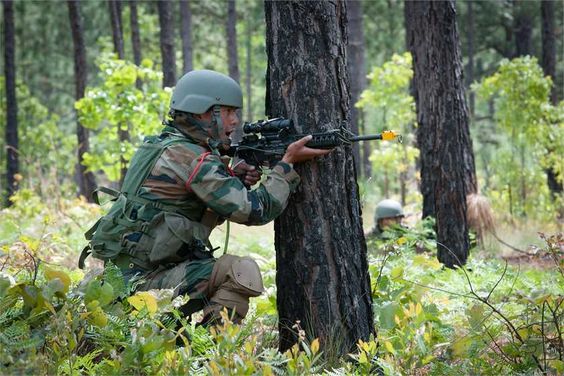Abstract
Homo sapiens have demonstrated a propensity to continuously upgrade their weapons over time. In that context the nature of warfare has also evolved thoroughly, contemporary warfare highlights the pinnacle of humankind’s annihilatory capacities. As the nature of warfare has progressed so has the concern over national security. New threats to a nation-state’s security are emerging daily in new forms and manifestations.
The objective of this research paper is to give an in-depth understanding about the relationship between contemporary warfare and national security, the emerging forms of threats to national security, how it must be tackled and the way forward.
The research methods involves understanding the nature of contemporary warfare, the psychology behind the actors involved in modern day conflicts, delving on the literature of military strategists like Alfred Thayer Mahan, Kautilya and how their principles and lessons are still relevant when it comes to bolstering the national security of nation-states in contemporary warfare.
Further the research paper will aim at articulating emerging national security threats like hybrid terrorism, contemporary forms of warfare like hybrid warfare, misinformation as a weapon of war, contemporary weapon systems like drones, spyware and their applications.
Introduction
War is perhaps one of the most common features of the human civilisation. Thomas Hobbes, the English philosopher had stated that as human nature is largely pessimistic and because human beings are materialist by nature, so war was a common feature of the state of nature which was characterised by him as “nasty, brutish and short”. Having said that war and its nature has evolved over time.
Yuval Noah Harari, the historian in his magnum opus work Sapiens-A Brief History of Humankind has argued that Homo sapiens have been able to establish their clear dominance by vanquishing other human races like Homo Neanderthals, Homo Erectus etc. It is therefore very clear that war and the tendency to go to war is ingrained in human genes. However thanks to the various revolutions over time such as the cognitive revolution, agricultural revolution etc has allowed human beings to become more civilised. However the nature of civility has varied over time.
Wars meanwhile continued unabated for reasons like religion, territorial expansion (world conquest), strategic considerations etc. The crusades for example were fought over religion, the conquests of Alexander the Great for territorial expansion, the establishment of the Mogul Empire for strategic considerations.
Fast forward to the present day, war has become more advanced and deadly; it is being fought increasingly by machines, for grand objectives. In this context the issue of national security takes precedence. Both are intertwined and considered absolutely essential for the survival of a nation-state in this somewhat anarchic and somewhat peaceful world to articulate the realist and liberal viewpoints on the world order.
Contemporary warfare is quite different from its predecessors as humankind is perhaps living in the most peaceful age it ever has, most of humankind has enough food to eat, has quite suitable standards of living, nevertheless warfare is changing and will perhaps continue to change in the future.
Contemporary Warfare- nature and psychology
Contemporary warfare is different from earlier forms of war where the focus was on territorial conquest or outright annihilation. Contemporary warfare is fought for strategic and tactical considerations. Warfare in the modern period is driven by the desire to establish hegemony over other nation-states as the international political order is anarchic with the non presence of a sovereign regulatory authority, and for that purpose states should continue to acquire power and exercise it by defining their national interests, this is the realist perception of warfare. However contemporary warfare is a bit different, it involves short term conflicts particularly low intensity conflicts where the threshold of escalation is kept deliberately low to avoid the involvement of more participants in the conflict.
Further, contemporary warfare is fought a lot less by soldiers, the emphasis is on the increasing use of unmanned weapons which can minimise human casualties, the use of drones particularly the MQ-1 Predator, MQ-9 Reaper and MQ-9B Predator by the American forces in Afghanistan during its war on terror years (2001-present) and in Iraq is a testimony to such an approach. Further the Russian invasion of Ukraine has seen Russia bombarding civilian as well as military targets using missiles both tactical and sometimes hypersonic.
Contemporary warfare is also a lot more restrained by its magnitude and scope due the involvement of several international institutions and international law’s coercive mechanisms to prevent war. This includes the United Nations’ Charter, the Geneva Convention on the protection of civilians, soldiers, prisoners of war (POW), and Hague Convention etc. International law allows sovereign states to make use of measures such as retortion, reprisals and other coercive mechanisms to retaliate against belligerents.
The psychology of actors involved in contemporary warfare is quite diverse, human nature is in this age quite docile, Steven Pinker in his excellent book Enlightenment Now: The Case for Reason, Science, Humanism and Progress has argued that we are living in perhaps the most peaceful of all times since the dawn of human civilisation. Nevertheless the war oriented of Homo sapiens has not gone away. Nation-states are after all composed of human beings.
The psychology of the actors is a romanticised vision of an imperial and glorious past where that particular nation-state had been a powerful force; attempts are made to revive such a nation-state by the means of war. The Russian invasion of Ukraine notwithstanding the aims of the Kremlin to ‘de-nazify’ it is to attempt strongly the revival of an Imperial Rus with Russia being the preeminent power in the Eurasian region- this was spelled out by former president of Russia Dmitry Medvedev in a tweet which was taken down minutes after it was posted.
Another psychological aspect of contemporary warfare is harm the interests of one’s adversary states, this manifests itself in the proxy wars that states wage against their foes when they are not able to fight them head on risking a total rout in direct conflicts. This is especially evident of Iran and its proxies in Middle east which routinely engage in confrontation with Israel, the latest being the 11 day Gaza war between Israel and Hamas.
National Security and contemporary warfare-a complicated relationship
National security is defined as the security of a state in both its internal as well as external dimensions. National security is today’s buzzword. It is a tool of both statecraft and academic interest. National security of nation-states differs from time to time depending on the domestic and international political circumstances.
Its relationship with contemporary warfare is a complex matter, the nature of national security is now-a-days more technology driven. As new threats in the form of spyware, malware, disinformation spreading tools are being increasingly used so the domain of national security requires continuous vigilance.
Different states have different national security considerations. Take India for example, while national security for India means maintenance of both internal and external stability particularly from threats like Maoism, Islamist fundamentalism etc it is connoted in typically hard power terms. However social media intermediaries such as Facebook, Twitter, Instagram is being used increasingly to serve vested interests so regulation of technology is essential.
It is essentially the national security perspective that the recent showdown between Twitter and the Government of India is on the issue of the government asking twitter to take down content which is not just prejudicial to national interest but directly harms the national security of India.
Contemporary warfare is being fought increasingly over the cyber domain, the smart weapons which are the product of the fourth industrial revolution designed to revolutionise military affairs.
National security concerns of India
India- the fifth largest economy in the world, possessing the world’s fourth largest armed force has complex national security concerns. Perhaps the biggest national security concern is from our hostile neighbours Pakistan and China. The Galwan valley clash of June 2020 and the subsequent disengagement by both sides from Gogra valley and later from Hot Springs show that China continues to remain a potent foe; on top of that there is Pakistan.
Protection of our borders along the north-east and north-west continue to remain the top concern, for that purpose the government of India has been aggressively building border infrastructure along its north-eastern parts bordering China. Internally, India’s biggest challenge remains the issue of radical Islam which promotes fundamentalism, jihadism and other mortal threats. To tackle these threats maritime security has been tightened to prevent the recurrence of a 26/11 type attack. Further, politics is slowly but surely being delinked from religion which is reflective in the various policies of the current government. Several models of de-radicalization has been used particularly the Maharashtra Model to sensitise people against falling into the trap of fundamentalist elements.
Another concern of India’s national security was highlighted by the current National Security Advisor Ajit Doval when he stated that civil society is the new frontier of warfare, it is being hijacked by vested interests and are using it against national security interests.
National security of India is also experiencing new threats in the form of hybrid terrorism which was seen in a spate of killings in the Kashmir valley earlier this year. This is especially concerning because the perpetrators of these acts are not officially designated as militants, they carry out attacks and after fleeing mix themselves in the normal civilian population.
National security concern of India will remain incomplete without a discussion of India’s maritime security. Over 95% of India’s trade in value and 70% by volume come from strategic sea lanes like Bab-el-Mandeb, Strait of Hormuz etc. Particularly important is the Indian Ocean Region, India has as a part of its SAGAR (Security and Growth for All in the Region) vision has articulated strongly the need to keep the strategic sea lanes of communication open and free.
The Quad countries’ focus on the Indian Ocean region and the US emphasis on the freedom of navigation in the Indian Ocean Region as well as in the South China Sea is a part of a broader strategy to keep the different sea lanes of communication open because if a hostile power were to enforce a blockade then it will constitute a direct threat to India’s national security.
Contemporary Warfare & Indian experience
Carl Von Clausewitz, the Prussian military officer and strategist in his masterpiece On War (Von Kriege in German) argued that showing benevolence is a sign of weakness which may end in disaster for any side. He therefore approved the use of short but strong destructive means to defeat the enemy, shatter his will and win the war.
Contemporary warfare is based exactly on this perception. However for a country like India which prides itself in calling a moralpolitik great power adopting this realist approach to war is not easy, but the Indian strategic and foreign policy elites’ thinking has changed, certainly in the last eight years. The present government has made it clear that without hard power it is difficult for a nation-state to survive the ruthless competition of the international political system.
Therefore taking lessons from strategists like Clausewitz, Kautilya and Sun Tzu who advocated the modernisation of armed forces and use of both fair and foul means to guard its national interests India has adopted a pragmatic-realist approach to foreign policy. In this context, India’s approach to warfare has changed.
India is modernizing its armed forces India has bought several state of the art weapons to bolster its national security by buying weapon systems like S-400, Dassault Rafale 4++ generation fighter jets, and concluding important defence agreements with countries like USA like COMCASA, LEMOA etc.
India is also in the process of acquiring advanced weapon systems like Ak-203 from Russia, Predator drones from USA. At the same time strengthening the cyberspace is essential, the union government has decided to develop an overarching data protection framework and strengthen data localisation measures in India.
An important aspect of India’s take on contemporary warfare is New Delhi’s realisation that self reliance is important for reliance on foreign partners may not always come in handy. The commissioning of India’s first indigenous aircraft carrier INS Vikrant which has 76% indigenous content shows that India is moving well ahead on its path.
The Russia-Ukraine war is also serving as a good lesson for India that over dependence on a single defence partner may not always be advantageous especially when that partner is facing defeats or setbacks in the actual battlefield. The recent Ukrainian advance against Russian invasion and the enormous pushback against Russian troops is a sign for New Delhi that in contemporary warfare it is best to have a diversified portfolio of partners to deliver weapons.
Having said that given the magnitude of destruction that modern warfare can wrought for any country, it is best to give more primacy to diplomacy and that the age of war is over. This is what Prime Minister of India Narendra Modi told his Russian counterpart Vladimir Putin in a bilateral meeting in the recently concluded Shanghai Cooperation Organisation (SCO) summit in Samarkand in Uzbekistan.
Tackling India’s chronic security concerns
Tackling national security problems is a complex task which requires careful planning, programming, collection of intelligence, and a strong institutional network to sustain setbacks. For a humongous country like India this becomes all the more difficult and challenging.
However the challenge is not insurmountable. The first thing that is necessary is to become economically robust. The major problem of the Indian economy is its deep economic inequality. According to Oxfam 2021 India report India is one of the most unequal societies in the world with the top 1% of the super rich earning as much as 57% of national income. Economics and commerce is directly related to national security in that an economically prosperous population will have more to spend on and hence will not be subsistent in their spending habits. Having large disposable income will allow the economy’s cycle to keep moving thereby allowing the virtuous cycle of growth to continue.
The second method of tackling national security is to have a resilient social contract which is flexible and strong enough not just to withstand exogenous shocks but can bounce back strongly despite facing shocks. Enforcement of the social contract requires robust institutions markets and a responsive state; this is what Markus K Brunnermeier in his book The Resilient Society- Economics after Covid argues. India has the social contract in the form of the constitution but the institutions necessary to enforce it impartially has been gradually undermined in the last few years by the present regime. The institutions which have suffered the most include the media, police, courts of law, Lokpal etc.
Thirdly, several nation-states like the erstwhile Yugoslavia, Syria, Lebanon etc are facing problems to the tumult in their social fabric and the imbalance in their diversity. Therefore maintaining national security requires maintaining a strong and inclusive social fabric which can cater to the needs of the minorities without leaving anybody behind. A form of consociational democracy in this context must be formed. However when it comes to India good governance is the panacea to such problems. The Modi government in this regard has an excellent track record, its flagship policies like PM Jan Dhan Yojana, Ujwala Yojana, PM Kisan Nidhi yojana etc have delivered without discrimination among citizens of any kind.
Fourthly, a new security paradigm is required, one which makes increasing use of technology to develop a robust security framework, this is mostly required for the Indian Police which continues to remain in the face of the Indian public an institution whose name sparks dread, terror and even hatred. It is necessary to emulate the NYPD (New York Police Department) model of minimum policing which the Himachal Pradesh is doing.
Fifthly, the need to adopt what Yuval Noah Harari, in his book 21 Lessons for the 21st century has written. He has stated that the need to bolster national security is to promote humility. He has stated that national, religious and cultural tensions are made worse by the grandiose felling that one’s nation, one’s religion and one’s culture are the most important, therefore my interests come first. In short, he was arguing that nationalism must be kept on leash which was already responsible for much destruction and carnage in the 20th century.
References
Sapiens: A Brief History of Humankind. Vintage Publishing, 2015.
Pinker, Steven. “Life.”. In Enlightenment Now, 53–67. Penguin USA, 2019.
Mohan, C. Raja. “With Russia’s Declining Influence, India Needs a New Strategy in Eurasia.” The Indian Express, September 21, 2022. https://indianexpress.com/article/opinion/columns/with-russias-declining-influence-india-needs-a-new-strategy-in-eurasia-8160821/.
“Explained: The Ongoing Violence in Gaza between Israel and Palestine.” The Indian Express, August 10, 2022. https://indianexpress.com/article/explained/explained-the-ongoing-violence-in-gaza-between-israel-and-palestine-8075343/.
Ani. “Civil Society New Frontier of War, Can Be Manipulated: NSA Ajit Doval.” Business Standard News. Business-Standard, November 13, 2021. https://www.business-standard.com/article/news-ani/civil-society-new-frontier-of-war-says-nsa-ajit-doval-can-be-manipulated-to-hurt-nation-s-interest-121111202123_1.html.
Quinn, Alison. “How History Shapes India’s Foreign Policy Goals.” E, August 4, 2018. https://www.e-ir.info/2018/08/04/how-history-shapes-indias-foreign-policy-goals/.
Kulkarni, Sushant. “The Complete Story of INS Vikrant, and Why India Already Wants to Build Another Aircraft Carrier.” The Indian Express, September 3, 2022. https://indianexpress.com/article/explained/coming-today-ins-vikrant-the-courageous-navy-8125880/.
Lau, Stuart, and Saim Saeed. “India’s Modi Tells Putin: This Is ‘Not the Era for War’.” POLITICO. POLITICO, September 16, 2022. https://www.politico.eu/article/narendra-modi-tells-vladimir-putin-war-has-no-place-in-todays-era/.
Brunnermeier, Markus Konrad. “Resilience and the Social Contract.”. In The Resilient Society: Economics after Covid, 29–58. Gurugram: Harper Business, 2022.
Bhatnagar, Amil. “Eye on the Graph, How Himachal Police Is Working to Check Crime, NYPD Style.” The Indian Express, September 15, 2022. https://indianexpress.com/article/cities/shimla/how-himachal-police-is-working-to-check-crime-nypd-style-8151143/.
Harari, Yuval Noah. “Humility”. In 21 Lessons for the 21st Century, 227–30. London: Vintage, 2019.
“Full Text: ‘Damage to Indian Democracy under Modi Is Lasting’: Pratap Bhanu Mehta.” The Wire. Accessed September 21, 2022. https://thewire.in/rights/full-text-damage-to-indian-democracy-under-modi-is-lasting-pratap-bhanu-mehta.
“Select Strategic Thinkers.” Essay. In Strategic Studies, 1–10. Allied Publishers Limited, 2013.
Modern Warfare and contemplation of strategic victory. (2021, January 27). Lt. gen. Rakesh Sharma PVSM,Uysm,AVSM,VSM (retd.). – Center For Land Warfare Studies (CLAWS). Retrieved October 4, 2022, from https://www.claws.in/modern-warfare-and-contemplation-of-strategic-victory/
Changing face of modern conflicts:shaping the Indian response. USI. (n.d.). Retrieved October 3, 2022, from https://usiofindia.org/publication/usi-journal/changing-face-of-modern-conflictsshaping-the-indian-response/

The writer is PG-II (Political Science with International Relations), Department of International Relations, Jadavpur University. He was also a research associate for think tank Defence Research and Studies(DRAS) and a columnist.











